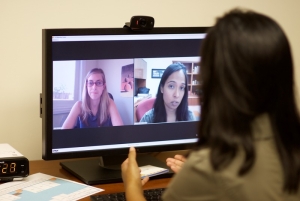Grant to Increase Virtual Mental Health Services for Caregivers
November 10, 2015 / by Joanna Scott- Giving
On any given day at USC Telehealth, the phone will ring and a desperate parent of a child with special needs will reach out for help. They are trying to be the best caregivers they can to their son or daughter, but their resilience and resources have been stretched thin. They know they need someone to talk to, but publicly funded mental health care is geared toward the individual with special needs, leaving no supportive services for the overburdened caregiver.
Through a generous $100,000 grant from QueensCare, USC Telehealth, a completely virtual telemental health clinic housed at the USC School of Social Work with services throughout the state of California, will be able to expand a new program to serve low-income parents and caregivers of special needs children or adult family members. Special needs can include autism, ADD/ADHD, learning difficulties, physical disability, developmental disability, or emotional and behavioral difficulties.
This year, USC Telehealth provided 132 families with weekly therapy sessions for caregivers who were experiencing severe depression, anxiety, stress, marital conflict and financial difficulties. Funding from QueensCare will allow an additional 90 families with special needs in Los Angeles County to receive the supportive services they so desperately need. The USC Telehealth program is filling a critical gap in services by focusing on parents, family members and other caregivers that do not have access to any other mental health programs.
“Parents often confront multiple challenges, including caregiving demands, posed not only by their children with special needs, but also their aging grandparents and typical siblings,” said Nadia Islam, clinical director for USC Telehealth. “These challenges cut across socioeconomic, geographical and cultural boundaries.”
Advancements in federal-level encryption and HIPAA-compliant technology make it possible for a therapist and client to securely connect in a matter of seconds from the privacy and convenience of their own home, or at a partner location for families that cannot afford a computer or Internet connection.
For QueensCare, the USC Telehealth program fits its philanthropic focus of supporting organizations that extend access to the underserved populations. “The program will provide access to mental health services for people who need it the most, free of charge,” said Bianca Rodas, communications manager for QueensCare. “The stigma surrounding mental health is still very present, and the opportunity to provide this type of care, in the comfort of one’s home, is an exciting way to work around that.”
Although QueensCare began funding mental health programs a few years ago, this is the first grant awarded for a telehealth program.
Currently, USC Telehealth will be offering this free, professional therapy program to caregivers of individuals with special needs through June 30, 2016. It is actively promoted through regional centers, Special Education Local Plan Areas (SELPA) and the special education staff of local area schools. For more information, visit USCTelehealth.com or call 866.740.6502.
To reference the work of our faculty online, we ask that you directly quote their work where possible and attribute it to "FACULTY NAME, a professor in the USC Suzanne Dworak-Peck School of Social Work” (LINK: https://dworakpeck.usc.edu)
